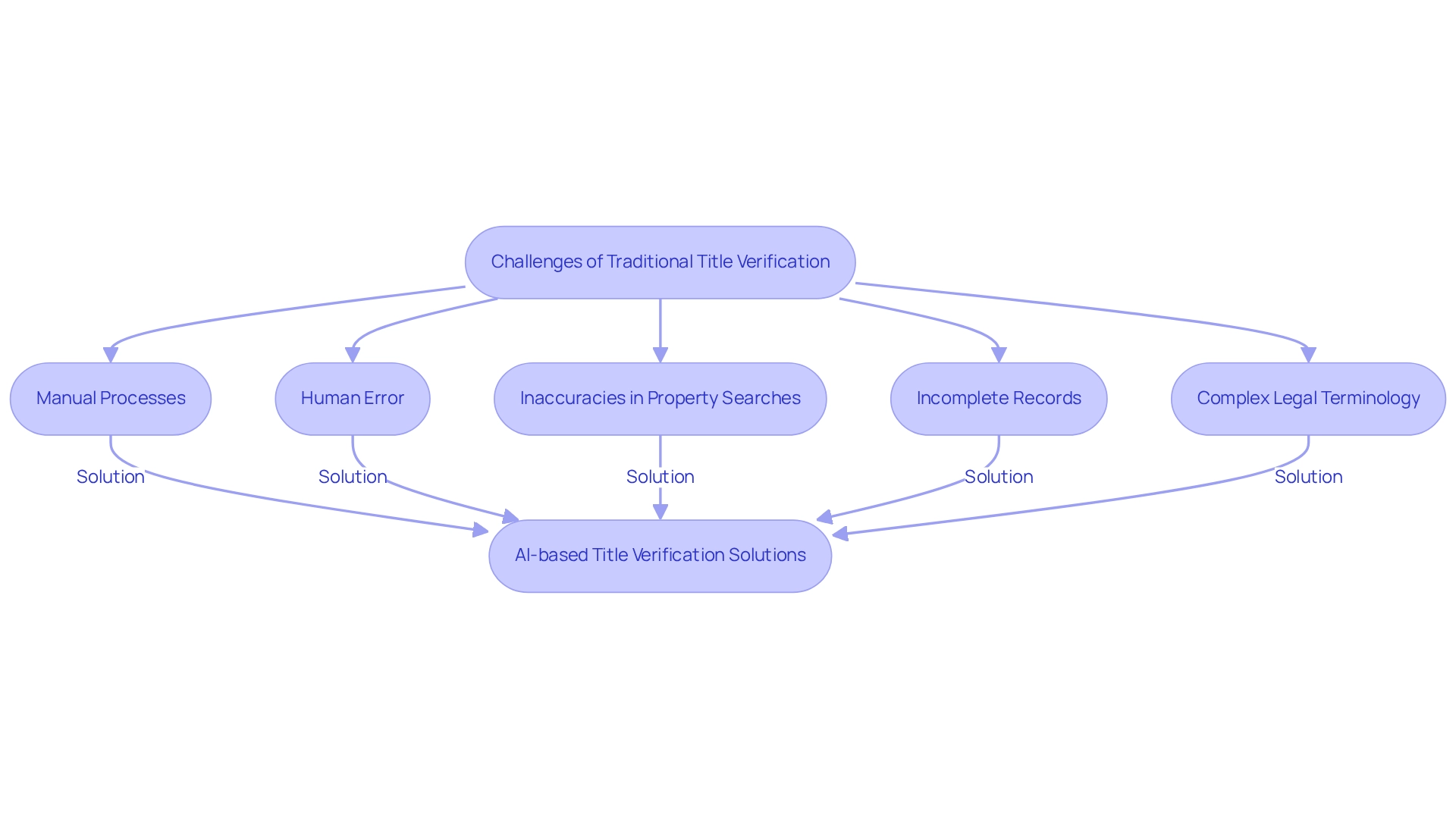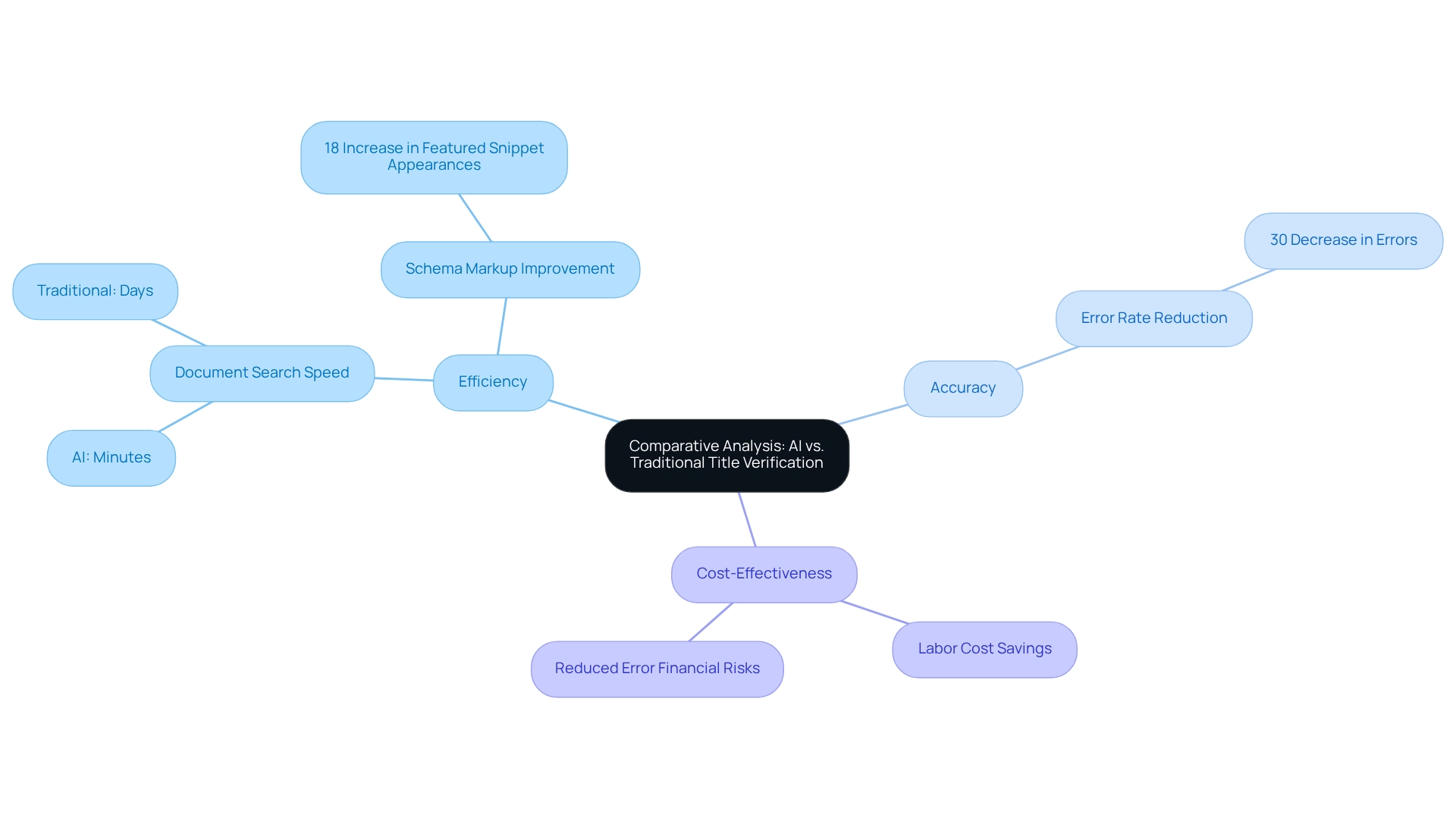Overview
AI-based title verification systems demonstrate a remarkable advantage over traditional methods, excelling in efficiency, accuracy, and cost-effectiveness. This article underscores the critical importance of precise title research, revealing the challenges inherent in manual processes. Notably, AI can conduct document searches in mere minutes, achieving up to 30% fewer errors than conventional methods. Consequently, this advancement not only bolsters the reliability of property transactions but also significantly reduces operational costs for firms. The shift towards AI solutions is not merely beneficial; it is essential for firms seeking to enhance their operational effectiveness in an increasingly competitive landscape.
Introduction
In the dynamic realm of real estate, the accuracy and efficiency of title verification stand as critical pillars for successful transactions. Traditional methods, often hindered by manual processes and prone to human error, are increasingly being eclipsed by innovative AI-based systems that herald a revolution in how property ownership is validated. By leveraging cutting-edge technologies such as machine learning and optical character recognition, these AI solutions not only accelerate the verification process but also bolster its reliability, effectively addressing the common pitfalls associated with outdated practices. As the industry transitions towards what is being termed 'Title Insurance 2.0,' grasping the transformative impact of AI on title verification becomes essential for real estate professionals striving to navigate this fast-paced landscape with confidence.
Understanding Title Verification: AI Systems vs. Traditional Approaches
Title verification is essential in real estate transactions, ensuring accurate property ownership. Conventional techniques depend on manual searches through public records, document files, and legal submissions, which can be labor-intensive and prone to human mistakes. In contrast, utilize to automate data extraction and analysis from extensive document collections. This automation significantly speeds up the validation process while enhancing accuracy by decreasing the chances of oversight typical in manual reviews.
Consequently, the use of [AI-based title verification systems](https://parseai.co/solutions/title-documents) represents a transformative change in , providing . With and approximately 47% beginning their house search online, the adoption of AI-based title verification systems in document confirmation is becoming increasingly significant, reflecting the evolving landscape of property where speed and accuracy are essential.
The ongoing evolution, termed '', highlights the industry's shift towards AI, data analytics, and cybersecurity, aiming to create faster, more secure systems, including AI-based title verification systems, for all stakeholders involved. Furthermore, AI-based title verification systems are expected to play a significant role in and practice, underscoring their importance in the current market.
Advantages of AI-Based Title Verification Systems
offer a range of compelling advantages over . Primarily, they drastically reduce the time needed for ownership searches. For instance, while manual searches can take days or even weeks, AI can analyze extensive datasets in mere seconds. This efficiency is underscored by findings indicating that 85% of property agents utilizing AI report , with projections suggesting that AI could cut the time property managers spend on by as much as 75%.
Moreover, the accuracy of AI systems frequently surpasses that of human researchers. These systems excel at recognizing patterns and detecting anomalies that might elude manual reviews. Their ability to continuously learn from new data further enhances their performance, ensuring that accuracy improves over time. Indeed, numerous success stories illustrate how have transformed conventional procedures, leading to more precise title searches.
Cost-effectiveness constitutes another vital advantage of AI solutions. By automating repetitive tasks, organizations can optimize resource allocation, resulting in considerable . As the landscape of title verification evolves, integrating AI-based title verification systems not only but also empowers firms to thrive in a competitive market, establishing these systems as essential tools for in 2025.
Furthermore, it is crucial to consider the broader context of AI's integration within the industry. A recent statistic reveals that 85% of the general public believes a nationwide initiative is necessary to ensure AI's safety and security, reflecting rising concerns regarding the technology's implications. Additionally, the White House issued an Executive Order in October 2023 aimed at establishing , highlighting the regulatory environment that property professionals must navigate as they adopt these innovative tools. As Midhat Tilawat remarked, " underscore the profound impact of technology on transforming traditional processes." This evolving landscape emphasizes the importance of AI-based title verification systems in enhancing efficiency, precision, and cost-effectiveness in the process of document authentication.
Challenges of Traditional Title Verification Methods
Conventional methods for confirming ownership encounter significant obstacles that undermine their efficiency. A primary concern is the reliance on manual processes, which are not only labor-intensive but also susceptible to human error. Statistics reveal that nearly 30% of property searches contain inaccuracies due to oversight, resulting in in transactions. Furthermore, exacerbate these issues, often leading to and eroded trust in the verification process.
by offering that expedite document processing and interpretation. Our example manager empowers users to swiftly annotate even a single instance to extract information from a vast array of unstructured documents, thereby enhancing the precision and effectiveness of research. This automation allows researchers to finalize abstracts and reports more rapidly, significantly reducing the likelihood of errors.
The complex legal terminology present in ownership documents necessitates specialized expertise, making it particularly challenging for non-experts to navigate. These obstacles underscore the urgent need for more efficient and reliable solutions, including , as the real estate industry continues to evolve.

Comparative Analysis: Efficiency, Accuracy, and Cost-Effectiveness
A comparative analysis of and conventional methods reveals . In terms of efficiency, ai-based title verification systems dramatically surpass their traditional counterparts, completing compared to the several days usually needed for manual searches. This quick turnaround is vital in a fast-moving property market where timely information is essential. Notably, have been shown to improve by 18%, further illustrating the efficiency gains in visibility and information retrieval.
Accuracy is another critical area where AI demonstrates superiority. Research indicates that AI systems can reduce error rates by as much as 30% compared to manual processes, . This enhancement in precision not only reduces the chance of expensive errors but also encourages increased confidence among property professionals. The expanding market for , especially in North America, highlights the rising dependence on ai-based title verification systems for precise document authentication.
Additionally, further strengthens the role of ai-based title verification systems as a favored option for document authentication. Organizations leveraging AI technologies can achieve while simultaneously decreasing the likelihood of errors that could lead to financial repercussions. A recent case study on advancements in AI agents highlights how these technologies can take on a larger share of administrative and data-entry tasks in the industry, leading to significant efficiency and cost savings.
As the property sector increasingly adopts technological innovations, the efficiency, precision, and cost advantages of ai-based title verification systems render them an essential resource for contemporary title research. Additionally, have been shown to improve user experience ratings by 33%, further demonstrating the positive impact of AI on the real estate sector.

Conclusion
The evolution of title verification is shifting towards AI-driven solutions that promise to revolutionize the real estate landscape. Traditional methods, characterized by labor-intensive manual processes, are increasingly being outpaced by advanced technologies that enhance efficiency, accuracy, and cost-effectiveness. AI systems not only expedite the title search process from days to mere minutes but also significantly reduce error rates, fostering greater trust among real estate professionals.
As the real estate industry embraces the concept of 'Title Insurance 2.0,' the integration of AI tools is becoming essential for navigating the complexities of property transactions. The benefits extend beyond mere speed; they encapsulate a transformative approach to title verification that minimizes human error and optimizes resource allocation. The compelling advantages of AI, including substantial time savings and improved accuracy, position these technologies as indispensable assets for real estate professionals aiming to thrive in a competitive market.
In light of the ongoing advancements and the regulatory focus on AI safety and security, it is crucial for stakeholders in the real estate sector to adopt these innovative solutions. Embracing AI not only addresses the challenges posed by traditional verification methods but also aligns with the industry's trajectory towards a more efficient and reliable future. As the landscape of title verification continues to evolve, the commitment to integrating AI technologies will undoubtedly shape the future of real estate transactions, paving the way for enhanced trust and smoother processes for all involved.
Frequently Asked Questions
Why is title verification important in real estate transactions?
Title verification is essential in real estate transactions to ensure accurate property ownership.
What are conventional methods of title verification?
Conventional methods depend on manual searches through public records, document files, and legal submissions, which can be labor-intensive and prone to human errors.
How do AI-based title verification systems differ from traditional methods?
AI-based title verification systems utilize advanced technologies such as machine learning and optical character recognition to automate data extraction and analysis, significantly speeding up the validation process and enhancing accuracy by reducing the chances of oversight.
What advantages do AI-based title verification systems offer?
They provide enhanced efficiency and dependability in document authentication, reducing the time and potential errors associated with manual reviews.
What is 'Title Insurance 2.0'?
Title Insurance 2.0 refers to the industry's shift towards AI, data analytics, and cybersecurity, aiming to create faster and more secure systems, including AI-based title verification systems.
How significant is the adoption of AI-based title verification systems in the current real estate market?
The adoption is becoming increasingly significant, especially as 96% of home purchasers look for properties online, reflecting the need for speed and accuracy in document confirmation.
What impact are AI-based title verification systems expected to have on the future of real estate law and practice?
They are expected to play a significant role in shaping the future of real estate law and practice, underscoring their importance in the current market.




